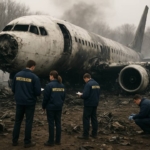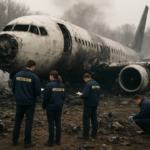
Following the tragic helicopter crash on Wednesday, 6th August, which claimed the lives of eight brave souls, I have been following developments closely, not only in my capacity as a journalist but also as someone with a personal interest in aviation and how aircraft operate.
It is right and fitting that we mourn the departed, and indeed, tributes have been pouring in, many of them deeply moving. May the souls of the departed rest in the bosom of the Almighty.
The President, John Mahama, has announced the establishment of an Accident Investigation Board to probe the cause of the crash. This is standard practice in aviation, and it is prudent for us to await the findings of the appointed experts before drawing conclusions.
In aviation accident investigations, key sources of evidence typically include the flight data recorder and cockpit voice recorder, collectively known as the “black box”, alongside accounts from eyewitnesses, survivors, and voluntary submissions from individuals with relevant information.
In this case, the flight data recorder would provide information on the aircraft’s performance parameters, engine readings, and other operational data up to the moment of the crash.
The cockpit voice recorder would capture conversations and ambient sounds within the cockpit, as well as possible audio clues from passengers.
Eyewitnesses can provide crucial observations, while survivors (where applicable) and other individuals may offer valuable insights.
Such information is usually kept strictly confidential during the investigative process, as premature public disclosure risks distorting or compromising the inquiry. Unfortunately, in the wake of this incident, our media space has been flooded with unverified and sensitive details—some of them coming from public officials.
For instance, the Mayor of Kumasi has stated that one of the victims made two separate phone calls shortly before the crash, suggesting that the crew may have attempted to divert from their intended landing spot.
While such information could prove valuable to investigators, it should be submitted directly to the inquiry team rather than broadcast to the public.
GhanaWeb reports that the Deputy Majority Chief Whip, Comfort Doyoe Cudjoe Ghansah, has stated that available evidence suggests that the blast occurred mid-air and not upon crash. She reportedly said this on Okay FM.
Similarly, there has been speculation that adverse weather conditions may have contributed to the accident. While this is plausible given the current rainy season, technical conclusions on such matters should come only from the official investigation.
I have also seen commentary on the state of the country’s military aircraft fleet. While this is a legitimate security concern, openly discussing operational details can be detrimental to national security.
In aviation safety investigations, I have studied over 100 documented cases, in which locals and witnesses typically share their accounts directly with security services or investigation authorities, not through open platforms, until the inquiry is complete.
The Media’s role
Ghanaian journalists have so far provided extensive coverage of the tragedy, but I would urge my colleagues to exercise restraint in releasing sensitive details, no matter the pressure to “break” a story.
The responsible course is to channel such information to the news editor, the Presidency, or the investigative board, which will help build an unbiased and credible report.
Risks of premature disclosure
When too much unverified information enters the public domain before an investigation concludes, several risks emerge:
- Excessive political commentary can politicise the tragedy, increasing the risk that findings may be influenced or distorted.
- It can conflict with or undermine technical findings, forcing investigators to navigate competing public narratives.
- It may create dissatisfaction or mistrust among bereaved families, government bodies, and security agencies.
The way forward
President John Mahama should direct that vital information be channelled to a designated desk at the Presidency or to the investigative board, rather than shared publicly.
The inquiry committee should also maintain active engagement with media houses, given that journalists are often the first to receive first-hand accounts.
Additionally, journalists, families, and close associates of the victims, especially the crew, hold critical insights that must be incorporated into the investigation process.
If we want a thorough investigation that yields meaningful safety recommendations for Ghana’s air transport sector, we must resist the temptation to publicly release sensitive details.
Instead, we should submit them directly to the appropriate authorities.
Finally, it is important to remember that even if the black box is recovered, it may not contain all the data needed to determine the cause of the crash, such as in cases of data loss or damage.
In such circumstances, responsibly handled witness accounts and supplementary information become even more vital.
The writer, Albert Kuzor, is a JoyNews journalist. He is an aviation enthusiast. The views expressed are his personal observations and suggestions, offered in the interest of aviation safety.
- President Commissions 36.5 Million Dollars Hospital In The Tain District
- You Will Not Go Free For Killing An Hard Working MP – Akufo-Addo To MP’s Killer
- I Will Lead You To Victory – Ato Forson Assures NDC Supporters
Visit Our Social Media for More




